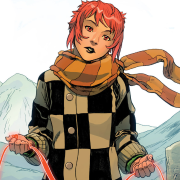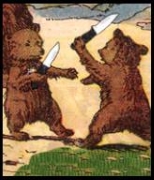|
Golden Bee posted:Burning Wheel does social combat really well (I remember a Song of Fire And Ice game ran in it where I played an elderly nun schoolteacher. The character felt plenty 'powerful'). Yeah. ASoIaF RPG handles regular combat and social "intrigues" about equally well. PCs can be plenty capable -- I made a character who was utterly worthless in combat and lovely at command, but could lie the pants off of anyone and be very persuasive. It ended up feeling like I was the party mage, more or less. The system isn't really too tied in with the setting, either. It just assumes low fantasy where magic is rare and PCs don't have access to it. REIGN would also work, as mentioned above.
|
|
|
|

|
| # ? May 18, 2024 04:27 |
|
Golden Bee posted:P .dot, the question of "Why are there so many adventurers" is important to address from a setting perspective. How many people become adventurers? How do they get quests? Who hires them? In my setting, most adventurers are mercenaries on retainer to a member of the Royal Family. So there are these little gangs of Reservoir Dog/Usual Suspect groups. It actually explains the unfamiliarity with each other quite well, because they weren't necessarily always on every job together with the whole gang whilst working for the Royals. The Royal Family bit the dust, so their dozen-ish little posses are roaming about freely now. The idea in-setting is that there is a bar in a sleepy little crossroads town where only locals and mercenaries are welcome (I likened it almost to a biker bar, but actually it's more like a cop bar) so everyone who was a mercenary for the Royal Family would have seen each other around, there. The current idea I have kicking around in my head is that the newbies will be a mercenary party returning from another continent just in time to save the existing party's collective asses. We're getting into "middle act" areas of the plot, so the PCs are gonna start to "lose" a lot, a la The Empire Strikes Back. Edit: To add (and because I should re-read my own posts before being redundant) The existing party is in the woods fighting a roving band of assholes who came over from the continent to the west. The new party would have been sent overseas (just before the Royal Family was assassinated) to try and intercept them, but arrived too late; they're just getting back into port when the local constabulary tells them the dudes they were after are engaging mercenaries in a small war in the forest, so they rush to the rescue just as everyone is about to TPK. The idea is this will allow for a dramatic scene where the existing players get to contemplate their own mortality for the first time, but also endears the new party to them in a quick and story-based, plausible way. Hopefully some new relationships start to blossom between PCs. P.d0t fucked around with this message at 17:43 on May 23, 2013 |
|
|
|
Had a bit of a tiff with one of my players the other day. It's a bit of a tangly situation but I'll try my best to untangle it. We were playing 13th Age, and it was our first time with the system. She's playing a Pirate Captain, capitalized because it's her background1. She'd already been quite vocal about not liking some things: - the background system1 ("I'd like to know exactly what my character is capable of") - the icon system2 ("I don't like being involved with powerful NPCs right from the start, that's for epic games") - little things like how you determine your AC from the middle of three attributes as opposed to the highest ("weird") For the benefits of those who don't know the in and outs of 13th Age: 1Backgrounds in 13th Age are effectively skills. Instead of assigning skill points to climbing, swimming, negotiating etc. you just write down "Pirate Captain +5" and then you get +5 to any skill check a pirate captain would reasonably have an advantage with. 2Icons are powerful NPCs; you assign point values to your relationship to 2-3 out of 13 icons and depending on rolls, that relationship might help you out this session/adventure/scene. Not a promising start but as a group we hit it off pretty well and had fun playing for a good few hours. The party got themselves in a situation where they had to find a temple in a strange harbor town, and the pirate captain player decided to just ask someone in the street and made a Charisma/Pirate Captain check that fell short of even the easiest DC available. Now, 13th Age follows the philosophy of "Fail Forward" - i.e., even if you blow a skill check, that shouldn't stop the adventure, rather you should still get what you wanted out of the check but there would be unfortunate consequences. With that in mind I thought it would be interesting to have the person they asked be a spotter for a local bandit gang - they gave the right directions, but these directions would take the party through an alley where the gang was lurking. So I narrated them following the directions until they came to this deserted alley and spotted the thugs stepping in from one end at the same time as the thugs that had been creeping up behind them. At that point my player interrupted and told me that she'd taken a background like Pirate Captain expecting to avoid exactly that kind of situation, and at the very least she should have gotten some kind of perception check to notice the thugs behind them as they entered the alley. And that effectively stopped the game for a good half hour in which we discussed game design. I explained that this was the result of her earlier botched check, she maintained that there should have been a separate check to avoid the dangerous situation entirely. That got us into discussing more basic aspects of gaming - she thinks players should always have a way to get out of or avoid a situation safely, I think avoiding conflict and danger entirely makes for a boring game and dealing with them makes for an exciting one. She considers combat a necessary evil of roleplaying games, I consider it a core component. (We had run one combat that session and it would remain the only one in ~8 hours. And apart from the discussion it was a really fun 8 hours but then if we test a system I think we should really test all aspects of it.) Other players weighed in saying they thought my narration of entering consecutively more dark and deserted side paths and alley had given everyone ample opportunity to interrupt and say, hey, do we really want to walk this way? And also that they thought it had been quite realistic, getting sent down the wrong way by unsavoury characters in a strange town in a moment of lapsed attention. Yet other players went and took a nap on the couch which I can't fault them for one bit. In the end we went back to the game and they managed to keep the thugs away through some decent intimidation rolls. Honestly though at that point I would have taken any opportunity to not run a combat for the player who had just told me she hated combat. I'm pretty much not motivated to DM for the group in this constellation anymore at all if we're having basic disagreements like that, but we'll work that out next session. Meanwhile I'm wondering: - chiefly, was that even a good way to implement the "fail forward" concept? - in an abstract sense: how many chances should a player really have to avoid danger/conflict/aspects they don't like? Not a character but a player. I can about see wanting one check to pick the right person to ask and another one to notice lurking thugs3 but where does it end? Roll a check to ask the right person, one to gauge their honestly when they answer, one at every street corner from that point on until you basically get the result you want? - what would be a good way to run a conflict avoidance game in a D&D-like system. When I run games I'm thinking Saints Row but for them, should I be thinking Metal Gear Solid? 3and I probably could have communicated the cause/effect principle of checks a bit better, too, especially that - as I understand it - one check isn't one discrete action and, yes, can determine the events of several minutes to hours of in-game time
|
|
|
|
I've had playerw similarly react to 'fail forward' in my games and it always boggles me. A few years ago I came to the conclusion that a ground state of 'nothing happens' after a failed check is like the least exciting possible result on a roll, and tried to implement it then, and I remember that every time it happened people would look at me funny. Like I was punishing them. Almost exactly the same thing happened in a Vampire game I was running. The player failed on a hunting roll; but they were strapped for time and I knew this particular player would sit around all night failing hunting checks rather than continue playing the game, so I said that they were successful, but at a price. I even informed them ahead of time that it would be at a price, and she agreed. It turns out the person they ended up feeding on was high as a kite, and the player had to roll to avoid getting drugged up. She was pretty upset because she felt that she should have been aware of that fact; I explained that failing a hunting roll while trying to grab-and-bag was license for that kind of thing. I don't get it. e: Players seem to have a naturally tendency to avoid conflict whenever possible. Which is hilarious to me because a lack of conflict is pretty much the stone-inscribed recipe for a dull story.
|
|
|
|
My Lovely Horse posted:- chiefly, was that even a good way to implement the "fail forward" concept? First of all, it was an excellent way of doing "fail forward". That's just how it's supposed to be done. So on that point, you got the right idea. I feel like players get one chance, maybe two if they do something really smart. Other than that, failing makes poo poo exciting. Say for example you play a band of robbers. You try to pick a lock of a house, the lock breaks. In no way will the gameplay experience benefit from you adding a backdoor for a second try, or letting them "fix" the lock. I think that if you give them the opportunity to respond by how you narrate or what clues you give out through description, then that is all that should be needed. If the players can't pay attention or you're narrative are lacking then I can see a problem happening. For the former, talk to the players and make sure they get that narrative is the clue to what is happening and paying attention will let them predict danger ahead of time (ex. Dark alleyway, take out weapons/send in a scout). For the latter just ask your players in the situation you describe "Was I unclear in the narrative? Were you confused?". It does seem like you did exactly that and at least some of your players were vocal about what they thought the narrative conveyed to them. It does seem like the pirate captain wants an easier time, with more safety checks. You just have to ask yourself if that will bring down the experience, if it doesn't then accommodate. If it does, then she needs to choose whether she wants to play like that.
|
|
|
|
Do the rest of the players also hate combat? This is very important.
|
|
|
|
My Lovely Horse posted:I'll try my best to untangle it. This all sounded perfectly reasonable to me. It seems like you handled the mechanics well. It is generally a good idea to sit down with a group and figure out what they are hoping to get out of gaming. This one player seems fairly adamant about not wanting combat, but what about the rest of the group? Failing forward is an interesting concept though. I've recently gotten into Fate Core in a big way and they have something similar. You can either fail, succeed at a major cost, a minor cost, succeed, or succeed with style depending on your roll. Your situation sounds like it would have been a major or minor cost depending on severity. The benefit with the way Fate handles it is you propose what the cost is before they make the decision so there's no surprise when it bites them in the rear end. Again I think it worked well the way you handled it for that system, but maybe you could try something like that? Mendrian posted:e: Players seem to have a naturally tendency to avoid conflict whenever possible. Which is hilarious to me because a lack of conflict is pretty much the stone-inscribed recipe for a dull story. I've found the exact opposite so far with Fate based games. We constantly throw ourselves under the bus to increase tension or make interesting things happen. I love it. 
Lallander fucked around with this message at 19:17 on May 29, 2013 |
|
|
Lallander posted:I've found the exact opposite so far with Fate based games. We constantly throw ourselves under the bus to increase tension or make interesting things happen. I love it. In, say, that "You feed but on a stoned guy", you just get penalties. EDIT: Not counting "game does not grind to to a halt" as a reward, here.
|
|
|
|
|
Mendrian posted:I've had playerw similarly react to 'fail forward' in my games and it always boggles me. A few years ago I came to the conclusion that a ground state of 'nothing happens' after a failed check is like the least exciting possible result on a roll, and tried to implement it then, and I remember that every time it happened people would look at me funny. Like I was punishing them. Achmed Jones posted:Do the rest of the players also hate combat? This is very important. Lallander posted:The benefit with the way Fate handles it is you propose what the cost is before they make the decision so there's no surprise when it bites them in the rear end. Good to know I'm not completely out of line regarding the core concepts there. The silver lining of all this is: we were going to have changing DMs anyway so I think for now I'll just finish up this adventure and then take a break and ask someone else to take over for a bit. The player most likely to step up usually runs drat decent games no matter the system and I've got a great character in mind. It's just first I gotta finish this up with, ironically, a minimum of table conflict.
|
|
|
|
My Lovely Horse posted:That does sound neat and worth a try. I just have a feeling I know how things would go from that point on: pump background bonuses as high as they go because o poo poo costs. You can also make sure failure is always interesting as well, otherwise why roll it?
|
|
|
|
Some players just don't like taking chances or risking loss even if the odds are in their favor. Irrational risk aversion is a common phenomenon in human psychology. This is why in my heartbreaker over in the design thread I let players take a mediocre 'default' outcome automatically and put the penalty behind a player choice over whether or not to take a chance (which is in their favor) for a better result.
|
|
|
|
...
Nostalgia4ColdWar fucked around with this message at 03:08 on Mar 31, 2017 |
|
|
|
My 2 cents on that situation: While I like your "fail forward" idea, I think that I would have given the players a chance to react to their sudden misfortune a little sooner than "AMBUSHED! ROLL INITIATIVE!". The very fact that the PC's could suddenly realize that they're on their way into a trap is misfortune in itself. The actual situation of being in a dark area of town, probably lost and possibly being watched or followed is a pretty tense situation. I would have allowed the PCs a chance to react to that first. If they didn't do anything about it, or messed up their 'sense motive' rolls, then by all means, ambush away.
|
|
|
|
Rocket Ace posted:My 2 cents on that situation: I think it's splitting hairs though. I would maybe have given them a chance to react but the ambush is still happening. Carefully backing out of the alleyway without any confrontation occurring is incredibly dull. The advantage of passing that roll is maybe a chance to plot an escape before the confrontation but it's going to be a momentary thing.
|
|
|
|
Mendrian posted:I think it's splitting hairs though. I would maybe have given them a chance to react but the ambush is still happening. Carefully backing out of the alleyway without any confrontation occurring is incredibly dull. The advantage of passing that roll is maybe a chance to plot an escape before the confrontation but it's going to be a momentary thing. But the problem is that the consequence of failure was: the entire party became completely unaware of their surroundings for an extended period of time and had no way to react until the ambush itself. I prefer to give the players a more immediate consequence that they can react to instead of removing their ability to react at all for a long time. Again, just my opinion, but I would have given the players a chance to notice something was off sooner: maybe not an all-out "YOU'RE BEING LED INTO AN AMBUSH" but some sort of build up a tension, giving them a chance to prepare for the upcoming conflict. Maybe, if a clever PC figures it out, and they call out their guide on their suspicious behavior, perhaps they still get ambushed right then and there but the bad guys are a little less prepared. Still a lovely situation, but the players still feel like they had some agency.
|
|
|
|
My Lovely Horse posted:Had a bit of a tiff with one of my players the other day. It's a bit of a tangly situation but I'll try my best to untangle it. You failed forward in a very good manner, imo. I can related to your player being unhappy, it sounds like 13th Age would not be the system for me (I like a bit more :grog:/ If the consequences were more severe, I'd say your player might have a point.
|
|
|
|
Guesticles posted:If there was someone in the party who was a thief or maybe would be alert to bandit ambush, I might give them a quick sensory roll to avoid the party being caught completely unawares. Yeah this part. Guesticles posted:If the consequences were more severe, I'd say your player might have a point. I guess that my personal grief about the situation is because it hits very close to home. In a recent Dark Heresy game I attended, a single member of the party failed their "sense motive" roll and the exact same thing happened, except no one else in the party had a chance to interfere or at the very least go "Huh? Why are we being led here? Something weird is going on..." In short, the ENTIRE party suffered the consequences of one player's failure without any way to react until it was too late. Yeah generic footpads aren't that bad, I guess, but in our case the footpads had autoguns and practically killed half of us because they got a surprise round. I guess that I empathise with the player being annoyed that they had no chance to react at all, ever. It can make you feel particularly powerless.
|
|
|
|
Not to argue - powerlessness is deprotagonizing - there's another side to this. Nothing feels more pointless as a GM then letting all 5 of your party members roll to notice 'something is awry.' Just tell them it's awry. The odds of all 5 players failing to roll whatever passes for a success on such a thing is miniscule and I can count the number of times one player noticing something over another actually mattering on one hand. I've taken to calling this 'redundant rolling', and I hate it. In combat at least you can use the roll to determine surprise versus not surprise and then at least the redundant rolling has a purpose. But when it's trying to see if one of the five people in the party notice that this guy you're talking to is being janky? Eh. It's not particularly realistic nor narratively interesting to give everyone a random chance to detect danger.
|
|
|
|
Incidentally my players do, when someone rolls a perception or especially knowledge check and I tell them they can't see/think of anything, tend to say "but maybe I can" and roll the same check, and I did always find that to defeat the purpose of things. I can't honestly say what I would have done if they actually had said "hold on, let's stop and think about this" during the whole leadup of "the streets become narrower etc.". I like to think I would have said "okay, roll for Wisdom/okay, you get outta there" and that would have been it, but who can tell. But like I said, at least one of them felt they had the opportunity to pull out. There's a story that happened in one of our D&D games where the wizard misplaced a fireball and, through a convoluted series of events transparent only to the DM, toppled an ancient, mile-high wizard's tower that we were, at that point in time, in. What followed was a tense rush to get the hell out and stay safe. Player agency is obviously great and a core feature of every good game but I don't think we'd keep reminding each other of The Time We Sat Down And Figured Out What Throwing A Fireball In There Would Do, And Then Didn't.
|
|
|
|
My Lovely Horse posted:Incidentally my players do, when someone rolls a perception or especially knowledge check and I tell them they can't see/think of anything, tend to say "but maybe I can" and roll the same check, and I did always find that to defeat the purpose of things. This. This is stupid. This is exactly what I'm talking about. quote:I can't honestly say what I would have done if they actually had said "hold on, let's stop and think about this" during the whole leadup of "the streets become narrower etc.". I like to think I would have said "okay, roll for Wisdom/okay, you get outta there" and that would have been it, but who can tell. But like I said, at least one of them felt they had the opportunity to pull out. It's also worth nothing that if you had told the whole party to roll to notice something was wrong, one of them would have passed and you would have removed all tension from the scene simultaneously. Conversely if one player had thought better of it and thought, 'woah, maybe something is wrong here', then you can use that person as the locus of the perception check and create more tension rather than less.
|
|
|
|
Rocket Ace posted:But the problem is that the consequence of failure was: the entire party became completely unaware of their surroundings for an extended period of time and had no way to react until the ambush itself. This isn't what happened, though. My Lovely Horse posted:Other players weighed in saying they thought my narration of entering consecutively more dark and deserted side paths and alley had given everyone ample opportunity to interrupt and say, hey, do we really want to walk this way? My Lovely Horse, it seems to me like (to simplify quite a bit) this is a discrepancy between two expected modes of running a game: GM: "You reach a door at the end of a corridor. Barbara, roll Detect Traps." Barbara: "Okay." vs. GM: "You reach a door at the end of a corridor." Barbara: "I use Detect Traps." GM: "Okay." Your player seems to have expected the first - "I have a Pirate Captain background, so the GM should tell me when my Pirate-Sense is tingling." - where you were (I think justifiably) using the second - "She has a Pirate Captain background, so she should be paying attention to the narration to see if her Pirate-Sense starts tingling." She also, I think, is making the wrong connection between the information check and the ambush; she feels that a successful Pirate Captain check would have identified the guy as dishonest, whereas in fact it was the failed Pirate Captain check that generated the dishonest nature of the character. What she's seeing, then, is an ambush planned ahead of time that she couldn't foresee because of the failed initial check - and one that you let her walk into without an opportunity to use her Pirate Captain skills to notice it, because if there had been an opportunity you would have told her.
|
|
|
|
Besesoth posted:She also, I think, is making the wrong connection between the information check and the ambush; she feels that a successful Pirate Captain check would have identified the guy as dishonest, whereas in fact it was the failed Pirate Captain check that generated the dishonest nature of the character. It didn't help that during the discussion I said something like "sometimes you guys are simply going to get into trouble" which very easily comes across as "when I decide there's trouble, no roll can save you" when what I meant was "when the dice come out that way there's going to be trouble and then you gotta be in the trouble before a roll can save you again." Heat of the moment. Maybe I'll take a few minutes next time to clear that up. Also, not entirely sure what I would have done if she'd made the roll. Most likely "he gives you directions and says goodbye," naturally, but would "he gives you directions but they seem very dodgy" have been an interesting new aspect to the game or needless sidetracking?
|
|
|
|
Rocket Ace posted:I guess that my personal grief about the situation is because it hits very close to home. I guess the question is "What is the penalty"; if you were to encounter the auto-gun footpads anyway, and the penalty was "you aren't aware, the footpads get a surprise round", that's not too bad. But (unless we're talking a critically blown roll) if the penalty was "You now get jumped by autogun footpads who get a surprise round", that's maybe a bit steep. I guess the "One person blows it for everyone" depends on the circumstance - if the Pirate Captain went off by their lonesome to get directions, I say sucks to be the party. If they were all at the same bar but working separately, unless the ambush was in furtherance of the plot somehow, I'd see if an alert player might get in to the conversation and assist. If the whole party is at the same table and conducting group interviews, then yes, one person blowing a roll and everyone suffering is sort of BS. (But then you run into the problem of "If we're all making sense motive rolls now that Pirate Captain rolled low, I bet they missed something.") I run 4e, so I use 'what are people trained in' a lot to determine, if something more than a minor annoyance is about to happen, if you get a shot at mitigation. Also, I might be a little biased about surprise rounds not being a very harsh penalty because our Bard has the Alertness feat (which prevents surprise), so even when my party does get jumped, they are guaranteed to have at least one friendly active. edit: Besesoth posted:GM: "You reach a door at the end of a corridor. Barbara, roll Detect Traps." Just wanted to quote this because this very clearly puts words on something I've not been able to vocalize very well. Guesticles fucked around with this message at 21:43 on May 29, 2013 |
|
|
|
My Lovely Horse posted:Ah yes, I realized afterwards a good deal of the issue had probably been communication, but I think that nails it right there. I don't think there's any such thing as 'needless sidetracking', so long as you're prepared to make all those things make sense in the broader picture later on. Success usually means, "the thing that I wanted comes to pass", and what she wanted was to convince this guy to give her directions. A success could give her good directions, reveal the guy's true intentions or even force the guy to admit his scheme and apologize (upon realizing she is the Dread Pirate <Charactername>, of course.)
|
|
|
|
For the record, I don't advocate letting the players completely negate or AVOID a hazard that they've walked into if they suddenly say "hold on, let's all make perception checks". I just think that if a player gets a hint and feels that something is awry, I give them a chance to react to the setting. If they succeed in interpreting the danger, I lessen the impact of the hazard a little. In the case of the ambush, instead of "HAHA FUCKERS! (PCs are all surprised)" it becomes "Oh poo poo, they spotted us. Get them! (PCs can be defensive, but they can't attack in the first round)" Failure is a failure, but I try to give the players the chance to lessen the problem to a degree if they react well. I don't PUNISH them for unlucky dice rolls. That sucks. Of course, I let 'em HAVE IT with both barrels if they DON'T get the hints or clues. I don't want to give you guys the impression that I'm a softie DM.
|
|
|
|
The key to avoid this problem, besides talking to everyone about what kind of game they want (before and after sessions), is this. You have to create a world where the players are free to know, notice, and say what their characters would. If the Larry the shy guy is playing Duke Francibald, and he puts a few Thees and Thous in his message to the prince, it should come off majestically. We know what he was getting at. On your end, you create fairness by constantly asking players what they're doing; who's entering the room first? (Even when there aren't any traps). Who wants to talk to the Sea hag, and who's hanging back? Which of one you is the most experienced with Elven Wine Vintages? I'd be fine with a failed "ask directions" roll putting you on the bad side of town, but it should lead to a second encounter, even just a mugging that's secretly an ambush. It gives the players a few seconds to be heroic (or cowardly), or even grab the mugger and use him as a human shield. When that happens, they'll have interacted with a world you created fairly.
|
|
|
|
Golden Bee posted:The key to avoid this problem, besides talking to everyone about what kind of game they want (before and after sessions), is this. I think these are all good ideas. Being fair is important. You want players to feel like they have a say in their fate, or else they have no agency, and that's dull. On the other hand there's a balance; if there's always a bunch of checks before a consequence, you feel like there's a cascading check effect. I fail this check, so I make a check to notice something, and then a check to react, and then a check to react to my failed reaction, and so on. I think so long as you're limiting the dice rolls to a handful of weighty, important tasks, giving a reaction roll or two is good. On asking: This is a sticky widget in any game. Asking too many questions slows down game as players struggle to strategize the best response, even if it's just in their own heads. But when you ask, you're tipping your hand before what's coming. "What order are you walking in" or any of a dozen variations pretty much says, "hey guys, there's danger in this area."
|
|
|
|
Well stated. I think my other personal beef is a GM who punishes the entire party based on ONE characters' gently caress-up. YES, there should always be consequences for failure: as long as those consequences are interesting, present an entertaining challenge or at the very least present an opportunity for the other characters to scramble and find ways to roll with the punch if they're also implicated. I mean, in general, of course. Some people LIKE to have a horrible stuff happen based on a bad dice roll, depending on the setting and system.
|
|
|
|
All my Pathfinder/d&d players are in the paragon tier. They just killed an entire dreadnaught full of mind flayers with only one PC having to be raised. They used solid-snake tactics, and I gave them a tool to nullify all psionics on board the ship, to make this winnable for them. I'm looking forward to epic level play, but need a few good modules as examples. Can anyone recommend any good epic level modules to me? Or offer any advice on how to challenge the players once they've reached god-like abilities? I mean, I've seen the gently caress-you stats for unkillable creatures, like Azatoth and the elemental evils, but realistically, what are some good monsters to throw at them once they get past level 20? God Of Paradise fucked around with this message at 07:27 on Jun 1, 2013 |
|
|
|
God Of Paradise posted:All my Pathfinder/d&d players are in the paragon tier. They just killed an entire dreadnaught full of mind flayers with only one PC having to be raised. They used solid-snake tactics, and I gave them a tool to nullify all psionics on board the ship, to make this winnable for them. When I DMed epic level 3.x I usually just made most epic level creatures immune to SoDs, but take a lot of damage from them if they failed the save. (so HP mattered, but the SoDs that every character obviously used because hey broken rules would matter). After that, use some simple templates (+20 to these stats, + this to HP/HD, + those to spells or spell like ability saves against and caster level etc.) to make regular monsters into epic monsters easily then reflavour them to whatever makes sense in your campaign, because actually straight up building an epic monster is a pain in the rear end in 3.x (system doesn't exactly have good math like 4th). Edit: Base 3.0 epic handbook I think had two templates for this, but I remember having to modify both of them to make them legitimately work in play(because whoever wrote the 3.0 epic handbook doesn't know what math is), and I also forget what they are called, but after I had the math worked out myself it worked pretty well, unfortunately I did this something like over 10 years ago so I can't just go back and grab the stats and give them to you without a time machine. goldjas fucked around with this message at 09:31 on Jun 1, 2013 |
|
|
|
4e D&D I was wondering if anyone has any advice about how to stage a "standoff" I can't find a clip on youtube, but think of the scene from "Three Kings" after they get the gold, and the woman gets shot. The idea in-game is [other country] has sent a small military contingent to occupy a border town, and The General has sent the PCs to arrest them if they refuse to leave. Not to say the players can't just go apeshit and kill everything, but I want to have a sort of back and forth negotiation where the tension slowly amps up. I assume the answer is some variation of a skill challenge, but I want an evocative way to do the "ok hands are on hilts now... ok now swords are out... and now people are pointing arrows at each other; poo poo is about to get real... that one guy in the back is TOTALLY making his move" etc. If anyone has some applicable experiences, let me know.
|
|
|
|
Would I be shooting myself in the foot if I didnít bother familiarizing myself with Pathfinder? I havenít played anything like D&D or its derivatives in years; I tend to run loosely structured games like FATE, Dungeon World, etc. It seems like Pathfinder dominates the industry, is it hard to find groups if I donít play it? Are there pathfinder players out there who arenít all about mechanics and fiddly bits, and are they easy to find?
|
|
|
|
Elderbean posted:Would I be shooting myself in the foot if I didnít bother familiarizing myself with Pathfinder? No, it's simple, because Pathfinder doesn't actually dominate the industry. Paizo is, however, better at marketing than Wizards' D&D team is. Ask around at your local game stores, you'll likely find people playing all kinds of games.
|
|
|
|
P.d0t posted:4e D&D I'd make this a skill challenge based on Insight, Bluff, Intimidate, and Diplomacy as primaries. Skill challenges work best when you deviate from the prescribed framework -- for instance, I had a skill challenge in my Eberron game where the parties' enemies had gimmicked a magical sky elevator the party was in so it was just free falling down Sharn. I put a tower of poker chips in front of the GM screen and each time a PC did something in the skill challenge, I took some chips away to mark the decreasing distance-to-ground. A critical failure made the chips start decreasing two at a time as the botched repair brought up the magic fields -- in the wrong direction, making the car accelerate downwards. Surges were lost as another failure induced a tumble in the elevator car and folks got knocked about (Acrobatics or Athletics to mitigate). Think about the in-game fiction, then find ways to communicate that urgency to your table. I'd go with a stack-of-chips model here as well, to represent the room's tension. Just to be a bastard, I'd also have a d6 behind the screen that represents how far off the visible number is from the actual number. Whichever side is doing better on their Insight rolls knows the real number. As the tension rises, you could call for characters to make Wisdom checks to keep control. Is that guy scratching...or is he reaching for a hidden dagger? Oh poo poo he's really got a dagger in there we got to shank him now! The players can do stuff like use Diplomacy at their own party to keep the highly-strung (low-wis) combat machine from flipping out, or deliberately play to destabilize the other side. For something like a negotiation scene I'd skip a formal turn order and just have people declare actions as they occur, then roll when appropriate. The party face can be delivering a bold speech (roll Diplo or Intimidate as suitable) while the rogue makes sure knives are at the ready while appearing harmless (Stealth, Bluff). In the mean time, the Fighter takes a half-step closer to the other side's bruiser so she can knock a wrist out of alignment should the bruiser lunge (Athletics). Each statement or action affects the tension level, so if the Fighter's positioning gets noticed, definitely add a chip or two to the tower, and if the party face makes a good Intimidate or Diplomacy roll, take a chip off the tower. At some tension threshold that you deem good, talking time stops and fight music starts. Don't tell the table what your magic number is; just tell them it's getting close and someone's going to snap soon. If you're calling for Wisdom composure rolls for the PCs, they'll get the idea on their own.
|
|
|
|
Elderbean posted:Would I be shooting myself in the foot if I didnít bother familiarizing myself with Pathfinder? I havenít played anything like D&D or its derivatives in years; I tend to run loosely structured games like FATE, Dungeon World, etc. I'd say don't learn it unless your players demand it. I GM a Pathfinder campaign mostly because its what my players want, but it is a much more intensive system both in prep and in rules-load on the GM. For my own enjoyment I'd rather GM FATE or DW.
|
|
|
|
Somewhat related: I have a group I introduced to D&D a couple years ago. We were all bored husbands of overly-busy medical students, so it was a good way to chill out, get drunk, and have some fun. Anyhow, school finished, and we all went our separate ways. Except now we're jonesin' to get the game going again. With that in mind, we're going to start experimenting with remote D&D. RPTools' MapTool is the first on our list to try, and we're going to just use it for the mapping/character-movement/etc stuff and leave all the actual game mechanics to players on their own (including honor-system dice rolling.) So the question: does anyone have any recommendations for a system which isn't too burdensome in its rules (while still providing a solid framework: we like the numbers side of the game) and has a good community of support for this sort of thing and good software for what we're after? It sounds like 4e and 3.5/Pathfinder both have the best support of any system in MapTool, but if anyone has any more other recommendations, I'm all ears. For now, since we're just using MapTool in its absolute most basic form, we're using 3e just because that's what they learned on, because that's what I had a ton of books for at the time we started playing. I know the system pretty drat well so it's not a huge burden, but I also know there are waaaay better options. tl;dr: I'm just looking for some advice on finding a more suitable replacement system (both game system and software system) for what we're actually doing here, e.g. remote D&D.
|
|
|
|
|
Bad Munki posted:
Maptools is the way to go for most people. However, honorable mention goes to roll20. It is a lot like Maptools, but I find it a bit simpler to use for simple setups. It has its own database for objects, tokens, pictures and music. You can even upload your own stuff. It also comes packaged with the basics like dice, a ruler, etc. As far as systems, both 3.5 and Pathfinder have some pretty extensive SRD's, which makes keeping up on rules without the books pretty convenient. You can find these here for 3.5 and here for Pathfinder Many people have strong feelings for Pathfinder for or against it, but my group likes the choices it gives them, so I wind up running it a lot. Kevsop fucked around with this message at 18:44 on Jun 11, 2013 |
|
|
|
Dungeon World is cheap (10 bucks for the PDF, everyone in your group can by one) and doesn't require huge rules knowledge by the players. All their moves could be put on a single page of Microsoft Word, or two pages of character sheet.
|
|
|
|
Golden Bee posted:Dungeon World is cheap So cheap, in fact, that you can get all of the core rules for free on their official website. Seriously: check out the Dungeon World thread here in this very forum.
|
|
|
|

|
| # ? May 18, 2024 04:27 |
Kevsop posted:honorable mention goes to roll20 Thanks for this. I signed up and am watching the tutorial, and so far I'm really liking what I see. It's like MapTool Web Lite, this might be just the ticket. I think I'll take the same little test adventure I made up and put it into Roll20, and then we can do the pepsi challenge. Thanks!  e: The only thing I feel like it's really missing is the automatic line of sight/lighting stuff that MapTool does, that one feature really turns my crank. Bad Munki fucked around with this message at 21:53 on Jun 11, 2013 |
|
|
|



















 P.S. STILL COMPLETELY DEVOID OF MERIT
P.S. STILL COMPLETELY DEVOID OF MERIT










